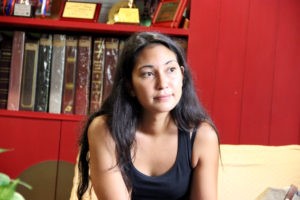– Pedro Daniel Oliveira
Local Government and NGOs favor the inclusion of disabled people, but there is resistance from the society, says Psychologist Ana Helena Amaral, for whom a mentality change is needed. In an interview with O CLARIM, she speaks on loss of the quality of life, coupled with the lack of leisure spaces and the difficulties created by casinos and the increase of tourists in Macau SAR.
You took your bachelor’s degree in Clinical Psychology in the University of Saint Joseph. How can the aging of Macau people create great pressure for life in society?
It creates some pressure regarding the employability and society’s contribution to the economy. There are basically fewer qualified local staff working and contributing to Macau. This creates certain problems, because if there’s a shortage of local labor, to recruit abroad is needed.
The northern part of the Macau Peninsula is one of the most densely populated areas in the world per square kilometer. Are we also facing some imbalances here?
Basically, it is how cities around the world are organized — we have the downtown and we have the edge of town, where house rentals are cheaper and perhaps people have less economic strength. Well, we can talk about the land size in Macau, the lower quality of life, and many people living in such a small place…
One can feel a growing pressure of living in Macau, as there are buildings to be built in height and few green spaces. Air pollution is also a major problem in several parts of the city. How can this kind of pressure be reflected in people’s social behavior?
I speak more from experience: I feel claustrophobic (laughs.) Now back to the subject. There are good and bad things. The fact that all these things happen in Macau is because the territory is small. So, there isn’t much room for big parks. If Macau is bigger, maybe that wouldn’t happen. Then there’s the other less bad part. Nevertheless, it gives me the idea that they want to put the whole world here in Macau. This applies to the casinos especially.
We are talking about consumerism…
Exactly. And in such a small space! People lose quality of life exactly in their space that should also be leisure. In this case, local people don’t have great options in terms of leisure or hobbies. And there’s this issue of not being easy to rent a house, because prices are too high. Tourism is certainly growing, but it doesn’t add value to those who live here. On the contrary, it adds to the Government revenues, although gaming is the main economic driving force.
What to do then?
When people want to enjoy or spend a good weekend they usually go to Hong Kong, to Mainland China, to Thailand, or other Asian countries. Macau should organize more festivals, not only on an annual basis, but more often. So, local people have something to do throughout the year, not just at certain times.
Your master’s thesis at the University of Saint Joseph is about the visibility that disabled people have in local society. What are your findings?
Macau society is not inclusive. That is to say, it somehow doesn’t accept disabled people. At least a few years ago it even rejected them. Both the Government and non-governmental associations are pro-inclusion. They do their best to get these people included in society.
It’s somehow a contradiction, since the general idea is that the Government does little in this regard.
I also had a bit of this idea. I felt that disabled people were not included in society, and the society itself was more inclusive. So, I thought the opposite of the findings I reached. Although the Government is pro-inclusive, and NGOs organize several events in order to promote social inclusion and, in a way, to do the most educational part, the truth is that all this is not enough.
Why is that so?
I read over 2,000 articles that went out over two years in two newspapers to make a comparison and I found about 20 that only referred to that [social inclusion.] Although the Government and local institutions promote inclusion, there’s still little awareness. There’s little coverage from TDM [Macau broadcast television station.] Likewise, there’s little that newspapers report on the matter. The media are very important for raising awareness. The problem is medical and paternalistic language is commonly used in the journalism, and even in some Government officials’ speeches. They should show society that even disabled people are equal to us. No more, no less. Disabled people can contribute to life in society. Society in general has to be a little flexible for them to be included.
Your thesis is based on articles published in two local Portuguese-language newspapers. Would you come to the same findings if your research covered the Chinese and English media?
Lack of inclusion happens all over the world, and not just in Macau. Also certain types of disabilities are seen worse by Macau society than others. The fact that society is now looking at the rights of disabled people is something that started late, because this is already a reality for decades in several Western countries. The mentality of people in Macau needs a change.


 Follow
Follow


